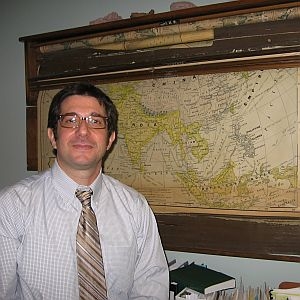 (Host) A Vermont lawyer will have an unusual role at the upcoming international climate negotiations in Copenhagen.
(Host) A Vermont lawyer will have an unusual role at the upcoming international climate negotiations in Copenhagen.
The lawyer is donating his time to represent the small Pacific island nation of Palau at the United Nations convention. The country is threatened by rising sea levels caused by climate change.
VPR’s John Dillon has more:
(Dillon) 192 countries will take part in the United Nations climate talks in Copenhagen. One of the smallest countries – both in population and in land mass – is Palau. The island nation is located in the Pacific Ocean, north of Indonesia and east of the Philippines.
Burlington lawyer Brian Dunkiel says Palau – along with other island countries – hopes to have a large voice in the climate debate.
(Dunkiel) "I think one thing that no one would debate is that these small island nations have moral authority. They are not substantially responsible for greenhouse emissions, yet they are the first to experience the brunt of the impacts from global warming."
(Dillon) Dunkiel specializes in environmental law. A number of years ago, he was part of litigation that eventually established the right for those harmed by climate change to sue in federal court.
That case and others is what brought Dunkiel to the attention of a non-profit organization called Islands First. The non-profit – made up of lawyers and scientists – was formed to help island nations on climate change issues.
Dunkiel says warmer temperatures threaten the heart of Palau’s tourism economy.
(Dunkiel) "A major aspect of the islands’ economy is based on tourism, especially tourism based on diving. The damage to coral reefs that is already occurring and will continue to occur if we stay on the business as usual path will severely impact the Republic of Palau."
(Dillon) Palau has an aggressive position in the climate talks. The country wants atmospheric levels of carbon dioxide reduced to 350 parts per million. That’s a far steeper reduction than called for by the United States.
Still, Dunkiel is realistic about the international politics of the climate negotiations, which are dominated by the U.S. and China, the world’s two biggest polluters.
(Dunkiel) "Copenhagen is going to fall short of what the international community was hoping would be a binding, final legal agreement."
(Dillon) Dunkiel says the key to U.S. policy on climate change is the political dynamic in the U.S. Senate, where climate change legislation is pending, and where any climate treaty would have to be ratified.
(Dunkiel) "What’s important is what can the Obama Administration deliver right now? And there’s a huge amount of uncertainty around that. Not through the administration’s fault, per se, but due to the uncertainty of what can get through the U.S. Senate. And I think it’s understandable that the international community would be waiting to see what the U.S. Senate is willing to do."
(Dillon) In Copenhagen, Dunkiel’s job will be to track the many negotiating sessions that could affect the country. He says the Republic of Palau wants financial help from the international community as it confronts the economic consequences of climate change.
Dunkiel is donating his legal services. Part of his travel and hotel expenses are being underwritten by Seventh Generation, a Burlington firm that specializes in environmentally friendly products.
For VPR News, I’m John Dillon.